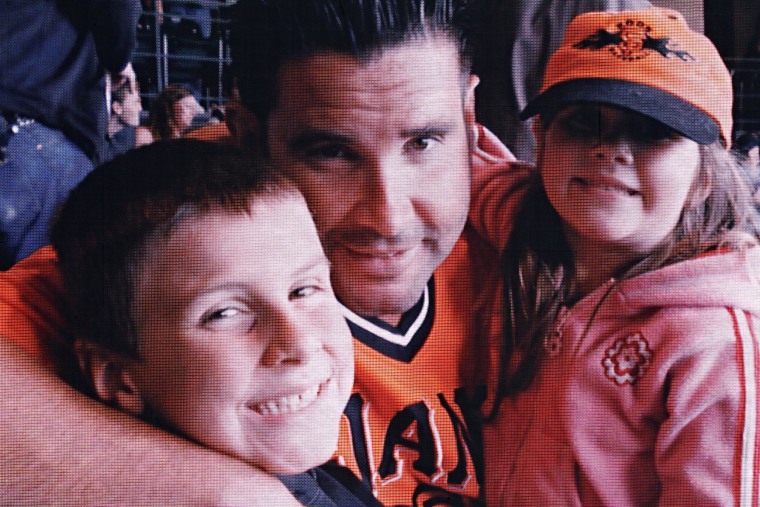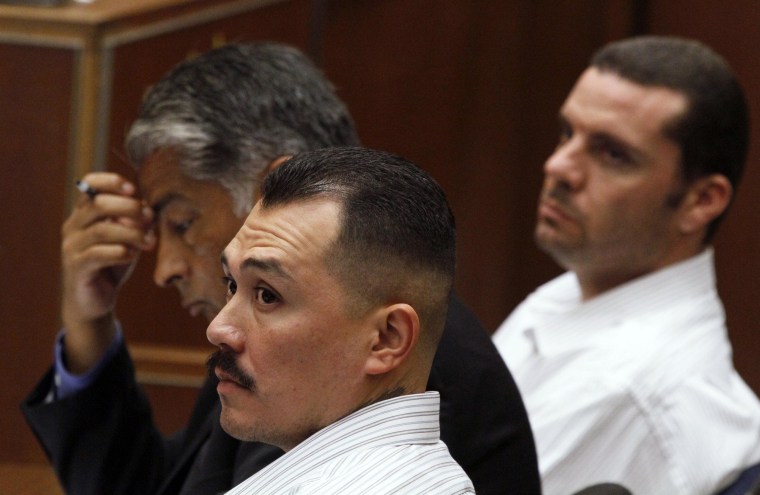Two Southern California men pleaded guilty in a Los Angeles courtroom Thursday morning in connection with the 2011 beating outside Dodger Stadium that left a San Francisco Giants fan with brain damage -- a vicious assault that highlighted security shortcomings at the famed ballpark and stunned baseball fans around the country.
Under the plea agreement, Louie Sanchez, 31, and Marvin Norwood, 32, are expected to be sentenced to eight years and four years, respectively, in state prison for their roles in the assault on Bryan Stow, a Santa Cruz, Calif., paramedic and father of two. Each of the men is expected to face a federal weapons charge after serving their sentences.
Stow’s father and two sisters, one of them reading a letter from the victim’s ex-wife, addressed the court with victim-impact statements. They spoke of their daily struggle to deal with Stow’s medical problems that stemmed from the attack and likened his injuries to a lifetime sentence.
"How can we even begin to consider forgiveness when you haven't asked for it?" one of his sisters told the court, reading from Stow's ex-wife's letter.
Stow's father David accused the defendants of cowardice. "The time you spend in prison is what you cretins deserve," he said.

Addressing the defendants from the bench, Los Angeles Superior Court Judge George G. Lomeli said he rarely comments at sentencing, but that the Stow beating case “demands it, screams it.”
He called the attack “absolutely brutal, absolutely vicious" and chastised Sanchez for smirking and both defendants for showing “no remorse whatsoever.”
“You are the biggest nightmare for individuals that attend public events,” Lomeli added. “My biggest fear is that we run into people like you who have no civility and no respect for individuals.”
Stow, 44, who continues to suffer from seizures and other complications as a result of the crime, remained at home, where he is receiving medical care.
The beating, which took place after the opening day matchup between the Dodgers and Giants on March 31, 2011, gained national attention and led to harsh criticism of then-Dodgers owner Frank McCourt over deteriorating security in and around the stadium. Just over seven months later McCourt -- his hand forced by Major League Baseball -- sold the club for $2 billion to Guggenheim Baseball Management.
The Stow case also fueled criticism of the Los Angeles Police Department, which initially arrested parolee Giovanni Ramirez for the crime but later acknowledged there was no concrete evidence linking him to the assault. Detectives with the department’s Robbery-Homicide Division, who did not initially investigate the case, were brought in and, after re-examining clues and re-interviewing witnesses, developed evidence that led to the arrests of Sanchez and Norwood.
The men were charged with multiple felonies, including mayhem and assault. Witnesses later testified at preliminary hearing that Sanchez was drunk and looking to brawl with Giants fans seated near him during the game, which he attended with the co-defendant, his then 11-year-old son and sister Dorene Sanchez, who also was Norwood’s girlfriend.

Sanchez was throwing peanut shells and sunflower seeds at Giants fans inside the ballpark as well as swearing at them, according to authorities and witnesses. Authorities said Sanchez took a swing at another unidentified Giants fan in the parking lot after the game. There also was an initial encounter between the defendants and Stow’s group of four paramedics, in which Sanchez shoved Stow and punched his friend in the face when he tried to step between the men, authorities said.
Both groups separated and moved on, according to authorities. But a short time later, investigators said Dorene Sanchez pointed in the direction of Stow and alleged that his group had made derogatory comments. Moments later, authorities said, Sanchez attacked Stow from behind, then Norwood joined in.
According to court documents presented in 2012, Stow suffered a skull fracture that resulted in the loss of a portion of his skull as well as damage to his brain. The court papers said Stow was "unable to walk, has loss of motor skills in his arms and hands, is unable to carry on a normal conversation, unable to control his bodily functions and unable to care for himself due to diffuse, severe, traumatic brain injury.”
Corey Maciel, a friend and colleague of Stow, testified during a five-day preliminary hearing that Stow was subjected to "full wind-up'' kicks to the head after being knocked to the ground with a "haymaker punch.'' He said another man kicked him repeatedly mid-section. Another witness, Mary Dolores Donley, testified that she went to the opener with friends and family. She heard his head hit the ground before turning to see Stow being kicked in the head.
In all, more than a dozen witnesses told the court about Sanchez’s actions in and outside the ballpark but none could positively identify either defendant as delivering the blows.
Defense attorneys seized on the lack of identification and the arrest of Giovanni Ramirez, who served time in state prison on an unrelated parole violation that had nothing to do with the Stow beating, as highlighting weaknesses in the prosecution’s case.
Some of the most damaging evidence came from the defendant’s own words while he was in a jail cell, waiting be placed in a witness line-up. In one instance, he spoke about how the police “know everything,” and appeared to acknowledge that he attacked Stow for disrespecting his loved ones.